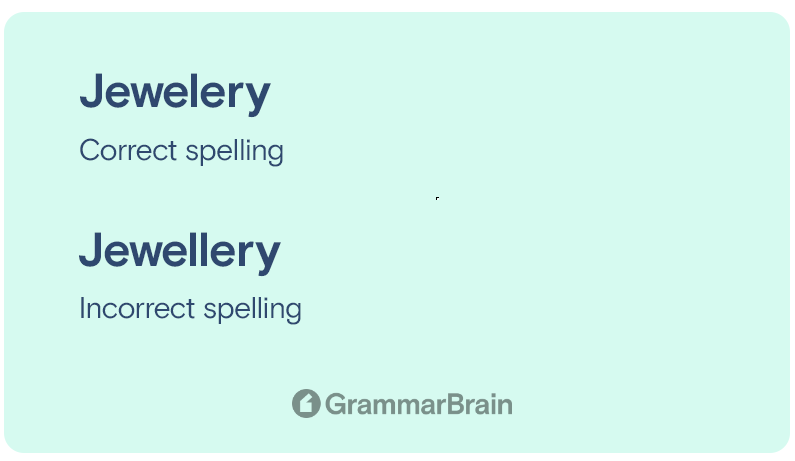Is it jewelry or jewellery? The long debate between American and British dialects is common. This debate lead to confusion between many words like jewelry or jewellery. We still often get confused as to which spelling is correct—is it jewelry or jewellery? Well, you will be surprised to know both spellings are correct. The conflicting dialects of America and Britain seem to bring a difference in the spelling of this noun.
Let us check out which spelling belongs to which English dialect and also when to use it.
Difference between jewelry and jewellery:
The major difference between the spelling of jewelry or jewellery is its origin and use. Jewellery is basically a noun, and this word describes ornamental pieces.
The word Jewelry is more commonly used in America and belongs to the American dialect.
Perhaps, the word jewellery is used in England and Australia more. So, the word ‘jewellery’ belongs to the British or Non-American dialect.
Let’s have a look at the base noun of the word ‘jewellery’ or ‘jewelry’, then we will find that ‘jewel’ is the common base word. The base word ‘jewel’ comes from Old French which leads to the formation of jewelry or jewellery.
As far as its use is concerned, it totally depends on the locality you belong to. if you are American then go for ‘jewelry’ because everyone in America uses the word ‘jewelry’. But other nations like Canada have freedom to use both spellings as per their convenience.
Definition and meaning of jewelry or jewellery:
The nouns Jewelry and Jewellery have a similar meanings. It is an ornamental piece made up of precious and delicate material to beautify people. Though, certain invaluable materials can be used to make a jewel piece.
Both words serve as substitutes for each other in English.
You can check out the proper definition of the noun jewelry by clicking here.

Examples of jewelry or jewellery:
Here are some examples where jewelry and jewellery are being used alternatively:
- Her husband bought gold jewellery for her on their anniversary.
- Yesterday, I went to jewellery store. I must say it was nicely maintained.
- My father gave me and my sister some lovely pieces of jewelry.
- He owns a jewelry shop in New York.
If by chance someone use Jewelry instead of Jewellery then they will be right. There is no difference in meaning of these words.
Where to use the jewelry and where to use jewellery?
People get easily confused between the usage of words ‘jewelry’ and ‘jewellery’. In America, the word ‘jewelry’ is more often used. Even, people who tend to have an American accent or rely on the American dialect use ‘jewelry’.
On the other hand, the word ‘jewellery’ is used in Britain and Australia more. If you are living in Britain or have a British accent then you should use ‘jewelry’.
Which spelling (jewelry or jewellery) is wrong?
None of the two spelling is wrong. Both spelling are right and can substitute for each other. One spelling is American and other is British.
Conclusion on Jewelry or Jewellery:
Jewelry and Jewellery are two different spelling that holds a similar meaning. Both the spellings are correct and used in a similar context. In America, people prefer using the short spelling ‘jewelry’, while in Britain and Australia people prefer using ‘jewellery’.
Inside this article
Fact checked:
Content is rigorously reviewed by a team of qualified and experienced fact checkers. Fact checkers review articles for factual accuracy, relevance, and timeliness. Learn more.
Core lessons
Glossary
- Abstract Noun
- Accusative Case
- Anecdote
- Antonym
- Active Sentence
- Adverb
- Adjective
- Allegory
- Alliteration
- Adjective Clause
- Adjective Phrase
- Ampersand
- Anastrophe
- Adverbial Clause
- Appositive Phrase
- Clause
- Compound Adjective
- Complex Sentence
- Compound Words
- Compound Predicate
- Common Noun
- Comparative Adjective
- Comparative and Superlative
- Compound Noun
- Compound Subject
- Compound Sentence
- Copular Verb
- Collective Noun
- Colloquialism
- Conciseness
- Consonance
- Conditional
- Concrete Noun
- Conjunction
- Conjugation
- Conditional Sentence
- Comma Splice
- Correlative Conjunction
- Coordinating Conjunction
- Coordinate Adjective
- Cumulative Adjective
- Dative Case
- Determiner
- Declarative Sentence
- Declarative Statement
- Direct Object Pronoun
- Direct Object
- Diction
- Diphthong
- Dangling Modifier
- Demonstrative Pronoun
- Demonstrative Adjective
- Direct Characterization
- Definite Article
- Doublespeak
- False Dilemma Fallacy
- Future Perfect Progressive
- Future Simple
- Future Perfect Continuous
- Future Perfect
- First Conditional
- Irregular Adjective
- Irregular Verb
- Imperative Sentence
- Indefinite Article
- Intransitive Verb
- Introductory Phrase
- Indefinite Pronoun
- Indirect Characterization
- Interrogative Sentence
- Intensive Pronoun
- Inanimate Object
- Indefinite Tense
- Infinitive Phrase
- Interjection
- Intensifier
- Infinitive
- Indicative Mood
- Participle
- Parallelism
- Prepositional Phrase
- Past Simple Tense
- Past Continuous Tense
- Past Perfect Tense
- Past Progressive Tense
- Present Simple Tense
- Present Perfect Tense
- Personal Pronoun
- Personification
- Persuasive Writing
- Parallel Structure
- Phrasal Verb
- Predicate Adjective
- Predicate Nominative
- Phonetic Language
- Plural Noun
- Punctuation
- Punctuation Marks
- Preposition
- Preposition of Place
- Parts of Speech
- Possessive Adjective
- Possessive Determiner
- Possessive Case
- Possessive Noun
- Proper Adjective
- Proper Noun
- Present Participle
- Prefix
- Predicate



